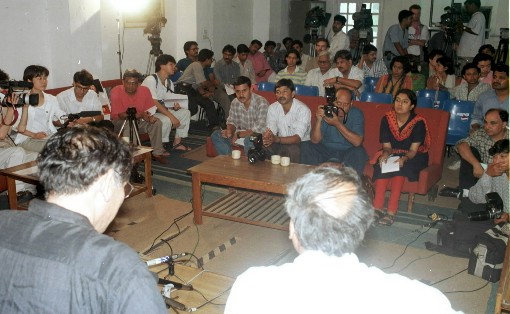Humanity Must Survive: A-bomb Survivor’s Journey to India and Pakistan, Part 7
Jul. 4, 2010
Reactions from the mass media
by Tetsuzo Yamane, Staff Writer
This look back at an A-bomb survivor's travels in India and Pakistan was originally published in July 1998.
Criticism of nuclear policy of the Japanese government
"Why doesn't Japan impose sanctions on the major nuclear powers?" Every time Yasuhiko Taketa, 65, an A-bomb survivor (hibakusha) and a resident of Aki Ward, Hiroshima, held a news conference, this question was thrown at him. The peace journey was, for the members of the delegation, also a journey of perplexity over criticism of Japan's nuclear policy.
In order to clarify the true intent of the question, I visited the office of the "Hindustan Times," an English-language newspaper located in a business district in New Delhi, India.
In an office on the fourth floor of the building, Ash Narain Roy, 48, deputy editor of the Hindustan Times, made biting remarks about the five nuclear powers, arguing that they were attempting to enforce a nuclear monopoly through the Nuclear Non-proliferation Treaty (NPT): "It's like five drunken men who drink alcohol every day saying to the others, 'Don't drink, it's bad for your health.'" He spoke with a friendly smile on his face.
However, Mr. Roy showed a more serious look when the conversation moved to the criticism surrounding the Japanese government. "Why doesn't the Japanese government place economic sanctions on the United States? I'm afraid that Japan has likely forgotten about the elimination of nuclear weapons, thinking only about economic growth with Western countries."
On June 24, after the news conference at a hotel in Rawalpindi, Pakistan, a 35-year-old reporter from the "Daily Jang," an Urdu-language newspaper, raised his voice: "Please tell me what sanctions Japan has placed on India, in response to its nuclear tests."
Without a pause, the reporter then defended Pakistan's nuclear tests, saying with pride, "We need to carry out nuclear tests in order to stand up to India. The public is backing the stance of the mass media."
The delegation held four news conferences in total, twice in India and twice in Pakistan. Sweat beaded on the forehead of Ken Sakamoto, secretary general of the Hiroshima Congress Against A- and H-bombs, whenever he was faced with criticism about the Japanese government. Though he made such responses as "Japan should leave the nuclear umbrella and press the nuclear weapon states more strongly," his answers were evasive.
Mr. Taketa also bore the distress of these moments. His face pained, he said, "We can only be persuasive if we effect change in the policy of Japan, which is protected by U.S. nuclear weapons and falls in line behind the United States in everything."
However, despite such sharp questioning, the mass media, on the whole, reported objectively on the visit of the delegation from Hiroshima.
The Hindustan Times, where Mr. Roy works, gave wide coverage of the delegation in its June 17th edition under the headline "Peace Message from Japanese Delegation." The paper carried a photo of Mr. Taketa, holding up a photo of the mushroom cloud.
"The News," an English-language newspaper in Pakistan, reported on the group's visit in its June 24th edition with a color photo and the headline "Do Not Let Your Flowers Die," citing Mr. Taketa's words.
The peace journey revealed to the delegation the different degree of interest in India and Pakistan with regard to nuclear issues.
In New Delhi, more than 100 reporters and others from 50 organizations crowded into the press club, while the two news conferences in Pakistan drew less than 20 people in total. Some Pakistani reporters did not even know the name of the Semipalatinsk nuclear site in Kazakhstan.
"This should not be simply a one-time affair," said Mr. Taketa after the last press conference in Lahore, Pakistan on June 26. "I want to believe that the mass media will cover the threat posed by nuclear weapons if hibakusha visit here again and again to share their experiences." He gave a tight smile.
(Originally published on July 9, 1998)








